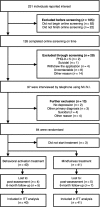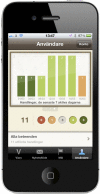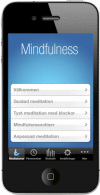Behavioural activation versus mindfulness-based guided self-help treatment administered through a smartphone application: a randomised controlled trial
- PMID: 24413342
- PMCID: PMC3902198
- DOI: 10.1136/bmjopen-2013-003440
Behavioural activation versus mindfulness-based guided self-help treatment administered through a smartphone application: a randomised controlled trial
Abstract
Objectives: Evaluating and comparing the effectiveness of two smartphone-delivered treatments: one based on behavioural activation (BA) and other on mindfulness.
Design: Parallel randomised controlled, open, trial. Participants were allocated using an online randomisation tool, handled by an independent person who was separate from the staff conducting the study.
Setting: General community, with recruitment nationally through mass media and advertisements.
Participants: 40 participants diagnosed with major depressive disorder received a BA treatment, and 41 participants received a mindfulness treatment. 9 participants were lost at the post-treatment.
Intervention ba: An 8-week long behaviour programme administered via a smartphone application. Mindfulness: An 8-week long mindfulness programme, administered via a smartphone application.
Main outcome measures: The Beck Depression Inventory-II (BDI-II) and the nine-item Patient Health Questionnaire Depression Scale (PHQ-9).
Results: 81 participants were randomised (mean age 36.0 years (SD=10.8)) and analysed. Results showed no significant interaction effects of group and time on any of the outcome measures either from pretreatment to post-treatment or from pretreatment to the 6-month follow-up. Subgroup analyses showed that the BA treatment was more effective than the mindfulness treatment among participants with higher initial severity of depression from pretreatment to the 6-month follow-up (PHQ-9: F (1, 362.1)=5.2, p<0.05). In contrast, the mindfulness treatment worked better than the BA treatment among participants with lower initial severity from pretreatment to the 6-month follow-up (PHQ-9: F (1, 69.3)=7.7, p<0.01); BDI-II: (F(1, 53.60)=6.25, p<0.05).
Conclusions: The two interventions did not differ significantly from one another. For participants with higher severity of depression, the treatment based on BA was superior to the treatment based on mindfulness. For participants with lower initial severity, the treatment based on mindfulness worked significantly better than the treatment based on BA.
Trial registration: Clinical Trials NCT01463020.
Keywords: Behavioral Activation; Depression; Mindfulness; Smartphone Application.
Figures
Similar articles
-
Behavioural activation therapy for post-stroke depression: the BEADS feasibility RCT.Health Technol Assess. 2019 Sep;23(47):1-176. doi: 10.3310/hta23470. Health Technol Assess. 2019. PMID: 31524133 Free PMC article. Clinical Trial.
-
Cost and Outcome of BehaviouRal Activation (COBRA): a randomised controlled trial of behavioural activation versus cognitive-behavioural therapy for depression.Health Technol Assess. 2017 Aug;21(46):1-366. doi: 10.3310/hta21460. Health Technol Assess. 2017. PMID: 28857042 Free PMC article. Clinical Trial.
-
Cost and Outcome of Behavioural Activation versus Cognitive Behavioural Therapy for Depression (COBRA): a randomised, controlled, non-inferiority trial.Lancet. 2016 Aug 27;388(10047):871-80. doi: 10.1016/S0140-6736(16)31140-0. Epub 2016 Jul 23. Lancet. 2016. PMID: 27461440 Free PMC article. Clinical Trial.
-
Novel Augmentation Strategies in Major Depression.Dan Med J. 2017 Apr;64(4):B5338. Dan Med J. 2017. PMID: 28385173 Review.
-
Antidepressant treatment with sertraline for adults with depressive symptoms in primary care: the PANDA research programme including RCT.Southampton (UK): NIHR Journals Library; 2019 Dec. Southampton (UK): NIHR Journals Library; 2019 Dec. PMID: 31869013 Free Books & Documents. Review.
Cited by
-
Acceptability of Digital Mental Health Interventions for Depression and Anxiety: Systematic Review.J Med Internet Res. 2024 Oct 28;26:e52609. doi: 10.2196/52609. J Med Internet Res. 2024. PMID: 39466300 Free PMC article.
-
Adjunctive use of mindfulness-based mobile application in depression: randomized controlled study.Eur Arch Psychiatry Clin Neurosci. 2024 Sep 4. doi: 10.1007/s00406-024-01884-y. Online ahead of print. Eur Arch Psychiatry Clin Neurosci. 2024. PMID: 39230745
-
Examining a Fully Automated Mobile-Based Behavioral Activation Intervention in Depression: Randomized Controlled Trial.JMIR Ment Health. 2024 Aug 30;11:e54252. doi: 10.2196/54252. JMIR Ment Health. 2024. PMID: 39212598 Free PMC article. Clinical Trial.
-
Study protocol of a sequential, multiple assignment, randomised trial using an adaptive intervention to reduce loneliness among Chinese older adults in Hong Kong.BMJ Open. 2024 Aug 17;14(8):e087245. doi: 10.1136/bmjopen-2024-087245. BMJ Open. 2024. PMID: 39153786 Free PMC article.
-
The impact of mindfulness apps on psychological processes of change: a systematic review.Npj Ment Health Res. 2024 Mar 18;3(1):14. doi: 10.1038/s44184-023-00048-5. Npj Ment Health Res. 2024. PMID: 38609511 Free PMC article. Review.
References
-
- Ebmeier K, Donaghey C, Steele J. Recent developments and current controversies in depression. Lancet 2006;367:153–67 - PubMed
-
- Smit F, Cuijpers P, Oostenbrink J, et al. Costs of nine common mental disorders: implications for curative and preventive psychiatry. J Ment Health Policy Econ 2006;9:193–200 - PubMed
-
- Cuijpers P, van Straten A, Andersson G, et al. Psychotherapy for depression in adults: a meta-analysis of comparative outcome studies. J Consult Clin Psychol 2008;76:909–22 - PubMed
-
- Cuijpers P, van Straten A, Warmerdam L. Behavioral activation treatments of depression: a meta-analysis. Clin Psychol Rev 2007;27:318–26 - PubMed
-
- Dimidjian S, Barrera M, Martell C, et al. The origins and current status of behavioral activation treatments for depression. Annu Rev Clin Psychol 2011;7:1–38 - PubMed
Publication types
MeSH terms
Associated data
LinkOut - more resources
Full Text Sources
Other Literature Sources




